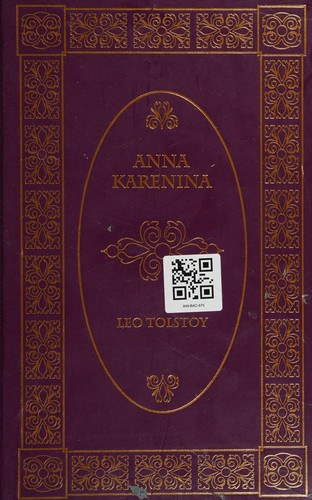Novella@bookwyrm.it reviewed Anna Karenina by Leo Tolstoy
None
3 stars
Da dove cominciare?
È un testo talmente vasto che ci si perde. E con questo ho detto contemporaneamente il più grande pregio e il più grande difetto.
Ho amato il Tolstoj dei racconti, di Resurrezione, della Sonata a Kreutzer, e invece questo grande romanzo, per cui è meritatamente famoso, mi ha lasciato perplessa.
La colpa non è della lettrice (ho ascoltato l'audiolibro letto molto bene da Anna Bonaiuto, mi piace la lettura partecipata piuttosto che quella distaccata professionale) quindi immagino sia proprio il testo, o un momento mio di insofferenza...
Impossibile dire che non sia meritevole. È un affresco gigantesco e contemporaneamente minuzioso della società russa dell'Ottocento. L'autore ha una capacità di introspezione psicologica talmente profonda che i suoi flussi di coscienza restituiscono persone e pensieri veri, talmente reali che quasi li tocchi, che vedi la persona in carne e ossa davanti ai tuoi occhi, con i difetti di ragionamento …
Da dove cominciare?
È un testo talmente vasto che ci si perde. E con questo ho detto contemporaneamente il più grande pregio e il più grande difetto.
Ho amato il Tolstoj dei racconti, di Resurrezione, della Sonata a Kreutzer, e invece questo grande romanzo, per cui è meritatamente famoso, mi ha lasciato perplessa.
La colpa non è della lettrice (ho ascoltato l'audiolibro letto molto bene da Anna Bonaiuto, mi piace la lettura partecipata piuttosto che quella distaccata professionale) quindi immagino sia proprio il testo, o un momento mio di insofferenza...
Impossibile dire che non sia meritevole. È un affresco gigantesco e contemporaneamente minuzioso della società russa dell'Ottocento. L'autore ha una capacità di introspezione psicologica talmente profonda che i suoi flussi di coscienza restituiscono persone e pensieri veri, talmente reali che quasi li tocchi, che vedi la persona in carne e ossa davanti ai tuoi occhi, con i difetti di ragionamento tipici che ognuno di noi per vari motivi ha vissuto. Personaggi non di carta, vivi.
Ma questo comporta spesso una lunghezza delle descrizioni intime a volte esasperante, come esasperanti sono le minuzie della società (la descrizione delle elezioni per me è stato il punto più basso del romanzo: tutto vero, e capisco anche il ruolo di critica alla società e alle apparenze che il testo voleva essere, ma una noia...).
Ripetuto per ogni personaggio principale e a volte per i comprimari... a un certo punto non avevo quasi più la voglia di andare avanti. E avrei fatto male, perché il finale merita, sia per la descrizione della morte della protagonista sia per l'epilogo della maturazione di Levin. Tolstoj ha un grado di introspezione forse quasi superiore a Dostoevskij, ma lo declina almeno qui all'eccesso, tanto che alcuni personaggi si avvitano letteralmente su se stessi. Ma mentre un dostoevskjiano assassino cade in delirio per un grave e serio motivo, in questo affresco tutti paiono inseguire una infelicità che o si sono procurata con le proprie mani o che è ingiustificata, quasi patologia.
Lapalissiano il confronto tra le coppie più in evidenza: prima Anna e Vronskij, una colpevole di cedere alla passione, l'altro colpevole di averle per un capriccio distrutto la vita (sì, mi è subito rimasto antipatico). Poi Levin e Kitty, la cui storia d'amore contrastata all'inizio mi ha fatto tenerezza, ma che si è poi trasformata in una unione fitta di contrasti (probabilmente l'autore rispecchia in questa coppia il suo rapporto coniugale particolarmente difficile) in cui lui appare quasi maniacale, e lei abbastanza sciocca. E questi dovrebbero essere i personaggi positivi, quelli che si amano davvero. La terza coppia, Stepan e Dolly, si basa esclusivamente sulla passiva accettazione da parte di lei della vita disinvolta, ipocrita e dispendiosa del marito. Un cretino di fatto, ma sai, ci sono i bambini... ed è assolutamente magnifico che la tutela del matrimonio di Dolly passi proprio da Anna, che solo dopo pochi giorni sfascerà clamorosamente il suo. Quello che di DEVE fare spesso non coincide con ciò che si VUOLE fare, quindi è più facile applicarlo agli altri che a se stessi.
Una menzione a parte per Karenin, la cui figura è un capolavoro: uomo anaffettivo, tendenzialmente superbo, non ama la moglie, non ama il figlio, non ha amici, crede di essere il migliore ma poi a un tratto si scopre solo... e piange, si fa prendere dalla compassione, vive un breve periodo in cui pare quasi diventato umano... fin quando nella sua debolezza non viene ghermito da una vecchia megera che ne fa il suo discepolo in una religione disumana e superstiziosa. Un grande ritratto di un uomo stupido più che malvagio, incapace di provare sentimenti e perciò incapace di comprendere.
La visione di Tolstoj, molto critica della società russa e della società umana in generale, potrebbe addirittura avere una sorta di rivolo femminista nel suo descrivere le sofferenze delle mogli; il problema è che di fatto la sua visione religiosa culminerà in un bigottismo negativo che alla fine sarà quasi simile a quello della Ivanovna: perché arriverà a negare qualsiasi valore al corporeo, w con ciò a considerare peccaminoso tutto ciò che riguarda il sesso, l'amore, il denaro. L'unica vita degna, quella del contadino che è puro per eccellenza. Non rendendosi conto che così condannava tutta la sua famiglia, e che nella sua vita personale si prendeva comunque le suo libertà che alla moglie non erano consentite. Per cui alla fine anche la pietà nei confronti di chi sbaglia diviene uno stigmatizzare i motivi di peccato; arrivando qui di a condannare la sua protagonista, che si è lasciata andare a una violenta passione che non poteva in alcun modo portarla a un finale positivo.
Finale che invece pare arridere a Levin, che arriva a una maturazione del suo percorso di fede, e che tenta un impossibile ma non per questo meno necessario cambiamento di modi.
In sintesi: la mia reazione si esprime in un un voto di 3.5. Lettura meritevole, personaggi fantastici, redazione eccessiva per lunghezza e intimismo. Affrontatelo se volete con tempo e pazienza e vi darà sicuramente qualcosa.





